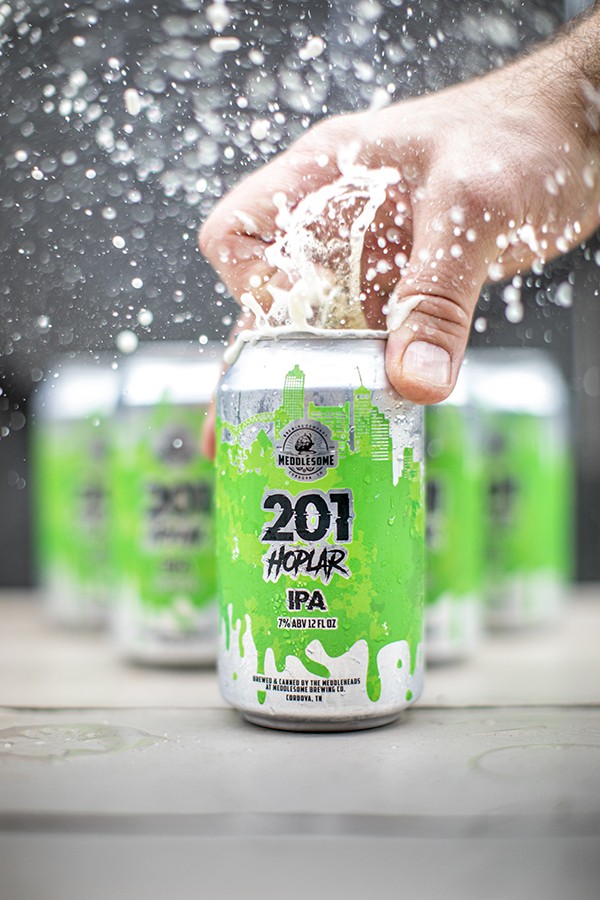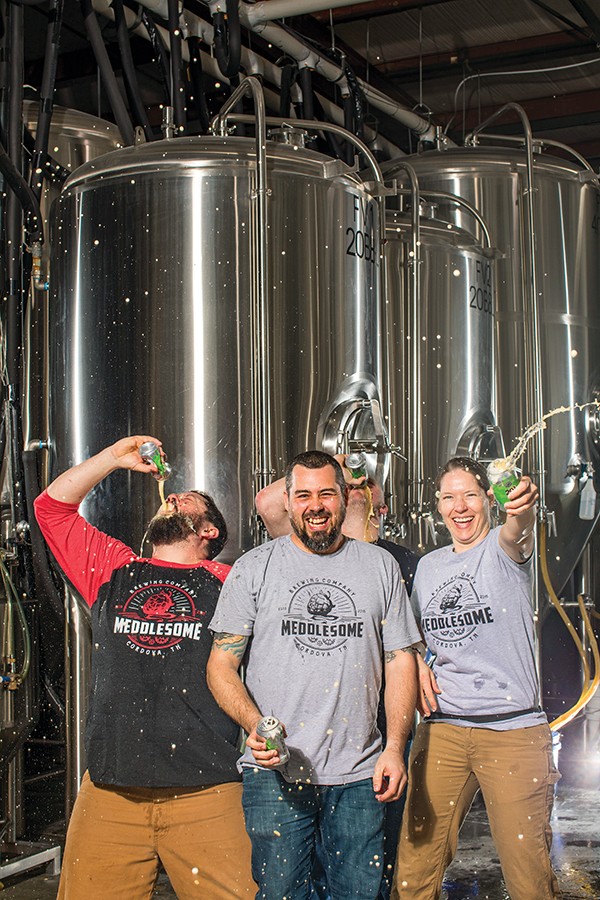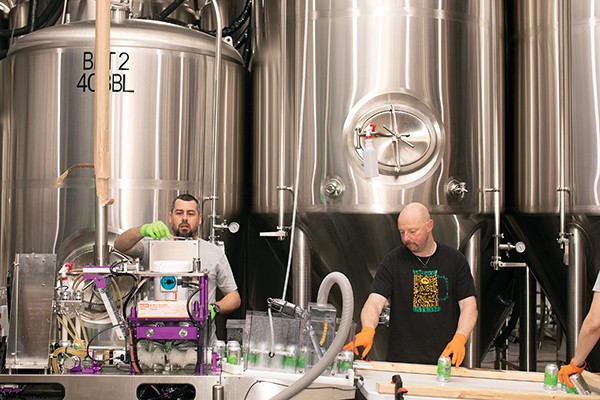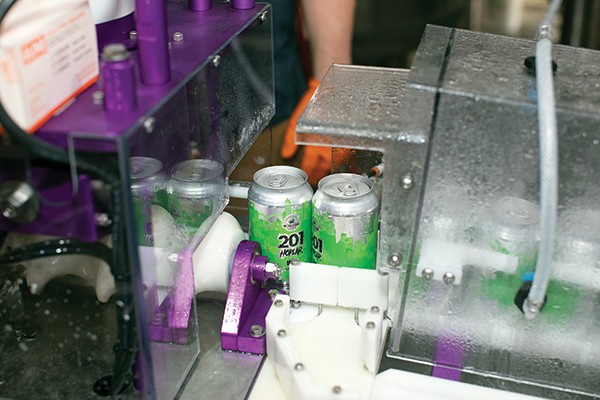Meddlesome Brewing Company’s West Coast IPA — 201 Hoplar — is the best craft beer in Memphis, according to the 530 voters in the Memphis Flyer‘s 2020 Beer Bracket Challenge, sponsored by our fine friends at the Young Avenue Deli.
This marks the third year in a row that 201 Hoplar has won the top spot in our challenge — a stunning three-peat made even more stunning as Meddlesome’s winning streak began the very first year of its operation.
“It’s an amazing feeling knowing that all of our patrons, fans, friends, and family care so much about us and our brand,” says Ben Pugh, who owns and founded Meddlesome with home-brewing pal Richie EsQuivel.

Each year, Pugh and EsQuivel have said they cannot believe their win and never expected it. Each win has been “crazy,” Pugh has said, leaving them feeling “blown away.” EsQuivel said of 201’s first-year win, “What the hell?”
According to EsQuivel, 201 Hoplar is a “West Coast IPA, through and through.” But while some new IPAs can be soft and fruity, EsQuivel says 201 Hoplar is “aggressive and bitter” but also “pineapple-y with citrus fruits.”
This year, we returned to our original format. The four bracket divisions separated Memphis craft beers into four very basic categories — light, dark, IPA, and seasonal. We blind-seeded the breweries’ beer choices in an event last month at Young Avenue Deli. Voters took it from there, moving 24 beers toward the championship.

Cheers to these meddling kids! (l-r) Richie EsQuivel, Ben Pugh, brewer Amber Rogers, and volunteer Larry Stone (back) celebrate Meddlesome Brewing Company’s three-peat victory in Memphis Flyer’s Beer Bracket Challenge.
Along the way, four beers emerged as winners in each of their categories. Wiseacre’s Tiny Bomb took top honors in the light division. Wiseacre’s Gotta Get Up to Get Down won in the dark division. Meddlesome’s 201 Hoplar was (obviously) the best IPA. Meddlesome’s Dirty Dova emerged on top of the seasonal division.
Here are some questions left after our fourth year of the Beer Bracket Challenge: Is Memphis an IPA town? What is Meddlesome’s secret sauce? And it appears new competitors will be lining up for next year’s challenge. So, can Meddlesome and 201 Hoplar do it again?

Meddlesome Brewing Company’s award-winning West Coast IPA 201 Hoplar is flowing into shiny, new cans — and hitting shelves this month.

Beer News You Can Use
The Memphis craft beer scene will look different this time next year. New breweries are on the way. New locations of existing breweries will come online. New beers will line local shelves. And familiar beers will line shelves farther from Memphis.
One brewery has new owners implementing a raft of changes. And, certainly, new beers will flow from all of the local brewers in the next 12 months.
In short, it’s a great time for Memphis craft beer and craft beer fans. And it’s about to get better.
There will be growth, for sure. But it won’t be like the rapid ramp-up of 2013 when three new breweries — Wiseacre, Memphis Made, and High Cotton — all opened within six months of each other.
But here’s a big win: Every craft brewery that has opened here since 2007 is still open. Maybe that sounds small, but it’s huge. Craft breweries in other cities open and close, sometimes with the regularity of local restaurants. That hasn’t happened here, and it speaks volumes about Memphis’ craft scene.
As craft beer’s profile has deepened, Memphians understand craft better than ever before. Our breweries continue to up production volume, settling their beers into more and more places and into the mouths of more and more consumers. And they ain’t slowing down.
The next 12 months will bring changes — big and small but all good — for the city’s craft scene. I’ll raise a pint to that. You should, too.
Ghost River
Bob Keskey and a group of partners bought Ghost River Brewing just more than a month ago. One of their first moves? They’re bringing back the tree.
Ghost River’s original, iconic logo — that spooky-looking bald cypress tree — will return soon to the spotlight of the iconic brand’s aesthetic. The tree was replaced with a lantern (another apt nod to the brand’s “wandering” spirit and to the Ghost River itself) in a brand redesign a few years ago.
Keskey says he started the pursuit to buy Ghost River about two years ago. It was an “on-again-off-again” situation for awhile with the Feinstone family (the previous owners). It was a “long dance,” he says, but the deal closed in January.
Keskey lives in Memphis but is a native of Milwaukee, Wisconsin, where “beer is a staple of our diet.” He originally fell for Ghost River Golden, a “nice, easy, drinkable beer.” Then he was “hooked” on Grind House, tried the rest of the beers, met head brewer Jimmy Randall, checked out the taproom, brought his investor group in to do the same, and began the pursuit to purchase the operation. He says Ghost River “just fit well with me.”
Changes at Ghost River will go well beyond the logo. The new group is investing capital (Keskey wouldn’t say how much) for a new canning line and a new keg line. He says they “completely redid the back production area” with new floors, new LED lighting, and new paint on the walls. “We’re giving the whole thing a facelift,” he says. Out front, work is underway for an expanded taproom to include a private area for indoor and outdoor events. All of it, Keskey says, will be complete by March 30th.
“Everything we’re doing comes either at the suggestion of the employees or customers or from [taproom manager] Victoria Keskey,” he says. “I’m not one of these owners that pushes his way through. So, this is about what the employees need, and I just made it happen.”
Memphis Filling Station
A simple question set Memphis Filling Station (MFS) on a new path, a journey that may conclude this year.
You may already know MFS, or think you do. The company began as a growler filling station, and they’ve poured other companies’ craft beers at dozens of events. But things changed when MFS co-founder Bryan Berretta was invited to bring some of his beers to an annual Brew Movement Against Muscular Sclerosis event.
“I was like, uh, no one drinks mine,” says Berretta. “I’m the only person who knows what it is. [The event organizer] said, ‘Well, bring it anyway.'”
So, Berretta and co-founder Heather Reed showed up with about 120 bottles and poured through almost all of them. At the end, Reed asked a path-changing question: “Why are we selling other people’s beer?”
That question led Berretta and Reed to negotiating on a space to allow them to sell MFS beer. The space would be shared with a food vendor in a sort of co-op situation. But Berretta isn’t providing more details than that.
As for beer, Berretta says he wants to do something different in the market. He says he’s into beers with “heavier, fruited, stronger flavors” and “crazy stuff” like a salted caramel pastry stout. “I want to be seen as the brewers’ brewery, where the other brewers feel comfortable coming in and doing collaborations with us, and it’s just fun and creativity and just forget the rest,” Berretta says.
Wiseacre
“We expect summer.” And that’s as close as Kellan Bartosch, owner and co-founder of Wiseacre Brewing Co., could predict for the opening of the company’s second location, a 43,500-square-foot, $7 million taproom and brewery now rising from the earth Downtown on B.B. King Boulevard between Butler and Vance. The taproom will make up only 5,000 square feet of the space. The magic for Bartosch and his brother and co-founder Davin Bartosch is in the rest of the space — the brewhouse, warehouse, lab, cellar, and grain mill.
“The biggest thing that [the new location] does for us is just allow us to fulfill our potential as a business,” says Kellan Bartosch.
Production capacity at the original Broad Avenue location was frustrating and tough, he says. The new location will allow growth. While many have asked, Bartosch says the opportunity for a regional brewery to go national (like Bell’s or Founders) just doesn’t really exist anymore, especially with the amount of breweries in the country now.
But for Davin Bartosch, Wiseacre’s head brewer, it’s more than that.
“The new location has more to do with us being able to make the best beer we can,” he says. “My goal, ever since we opened, was to make the best beer in the world. Having nicer equipment allows us to get much better at making beer.”
A new canning line will help eliminate more oxygen in the cans, which extends shelf life and creates consistency.
For now, look for Wiseacre’s Regular Pale Ale year round, a fresh series of “new-age-y” IPAs, and new packaging, including 16-ounce cans, more 12-packs, and even 24-packs.
Crosstown
It was a hell of a party, especially for a 2-year-old.
The planning was intense, tons of new beer was made and poured, tons of friends came, and at its height, the party was a raucous, full-tilt boogie. It’s not every day a brewery turns 2. Even though Crosstown Brewing Company sold more beer on its second birthday than it did on its opening night, co-founder Clark Ortkiese won’t ever forget that first night.
“Of course, we’re better at serving than before, and our point of sale [system] didn’t crash, and the draft system wasn’t completely screwed up like it was on the first day,” Ortkiese remembers.
Two years on, it’s creativity that keeps Ortkiese feeling like work ain’t work.
“That’s how I get to cut loose creatively and how [head brewer] Stephen Tate gets to cut loose,” Ortkiese says. “We just figure out how we’re going to do this … and work toward it.”
Look for that creativity in new, seasonal cans including Delta Cat, a low-alcohol, Euro-born grisette (dropping this week), and a New England IPA called Chowda, out later in March.
Ortkiese says taking risks on esoteric styles comes easier as the Memphis craft beer market matures. For proof, he points to two “successful” sour-beer can releases over the last two summers.
“So, yeah, I trust the market enough to say let’s go do some weird stuff and some old-school stuff,” Ortkiese says.
Meddlesome
Meddlesome Brewing Company is readying to answer the question its fans have been asking since they opened: When can they find Meddlesome beers in stores?
“Every day we get phone calls and Facebook messages: Where can I buy your beer?” says Meddlesome owner and co-founder Ben Pugh. “Well, I can give you a list of places, but if you’re not going to bars or restaurants you’re probably not going to find it.”
Pugh says Meddlesome is a self-funded operation, and canning (either contract or in-house) was put on hold until they could afford it. Now that time has come. The award-winning 201 Hoplar is now flowing into silver cans, 12 ounces at a time. Pugh says to look for Meddlesome on shelves this month.
The brewery hit the ground running after they opened about two years ago, winning the hearts (and tastebuds) of Cordova craft fans and enough votes to win our Beer Bracket Challenge for three years in a row. They’ve been competing for taps all over town and will now compete for shelf space.
At the same time, they haven’t stopped meddling (you knew it was coming) creatively. Meddlesome did a special bottle release each Saturday in November, including Hot Mess, an imperial red ale made with Red Hots; All the Cookies, an imperial oatmeal raisin cookie brown ale; and Devil’s Water, a Belgian quad.
Memphis Made
You (probably) haven’t had a beer in the Ravine yet. But you (probably) will have come this time next year. The Ravine is a $5 million public greenspace concept now underway by Development Services Group and the Downtown Memphis Commission.
Before long, you’ll be Instagramming the hours away and drinking craft beer in a ravine on an old rail spur behind nondescript buildings between Union and Monroe (close to the old Commercial Appeal building).
“We kind of specialize in unique spaces here at Memphis Made,” says company co-founder Andy Ashby. “Our taproom is definitely different than a lot of others. So the unconventional design [in the Ravine] didn’t faze us in the least. We actually think there are opportunities there.”
New production space there will allow Memphis Made Brewing Co. to up its volume. It’s good timing, as the company readies to enter new markets after a recently signed distribution deal with Ajax. But the location came first and the distribution deal came second, says company co-founder Drew Barton.
“Finding that second location and knowing that we could push production was not a necessity to go find a distributor, but it definitely made the choice a little easier,” Barton says. “Had we not gone and found the second location or knew that we wanted to expand that way, we would have been totally happy just brewing on Cooper. But we knew that we could move beyond the volume we were doing to get to that next level.”
Timelines on projects like these can get squishy, but Barton says to look for the Ravine location to open “this year.”
Memphis Made also recently signed a separate distribution deal with Clark distributors in Mississippi. So, very soon you’ll be able to find Junt, Cat Nap, and more in stores outside of Shelby County for the first time.
Grind City
Back then, the area didn’t have a fancy name, really. There was a hill with a ragged collection of decrepit buildings. But there was that view. When Hopper Seely climbed the hill and saw the view, he knew.
“Once I saw that view, I was like, I don’t care how bad this place is to open …” Seely says, trailing off amid the construction noise. “Some days I wish I really didn’t ever say that. Once we got construction started — and if I’m ever having a bad day — I just look at that view and know it’s going to be worth it.”
Seely’s Grind City Brewing Co. sits behind the carriage and horse barns on North Second, above the east bank of Wolf River harbor. Signs in the area herald it as the “carriage district,” but it’s always kinda sorta been in the Uptown area and is now in what developers call the Snuff District.
All of it sits just north of Downtown, and now, atop that small hill, is a site under full construction, with one modern building that shines like an iPhone at a barn-raising. Walk out the back of Grind City Brewing’s massive taproom and onto its patio and you’ll see that view — the Pyramid, some of the city’s most iconic skyscrapers, and the big “M” of the Hernando de Soto Bridge.
Open in the “spring-ish” time, according to Seely, that patio and view should be very Instragram-friendly.
But Grind City is way more than a patio. Seely was 12 when he began brewing beer with his dad. He was 19 when he quit college and entered a brewing school in England. And in his early 20s, he won awards for his beers and business plans.
Seely and Grind City head brewer Mark Patrick are already cranking out beers. Out of the gate, Grind City will offer a light beer, an IPA, and a black (nitro!) lager. Later, they’ll begin offering up seasonals and one-offs.
Soul & Spirits
“We are in very deep construction,” says Soul & Spirits Brewery co-founder and head brewer Ryan Allen.
Soul & Spirits is planned for an old building, also in the Uptown/Snuff District on Main Street. But Allen says it’s way too early to talk about a timeline to get the doors open, though the company’s Facebook page says “coming 2020.”
But Allen did talk beers: “We make a diverse range of beers for a diverse range of people,” he says. “We’re looking at both old-world styles and new-world styles and even being creative in our right, doing some of our own things that you may not have seen before.”
Allen earned his Masters Brewing Diploma in Germany. It’s much of that “old world” education that leads him to the mindset that brewers should really know how to brew “a great light lager beer.” Then, apply that knowledge to any kind of “new-world styles.”
High Cotton
You’ve definitely started to see more High Cotton out there. Thanks to a November distribution deal with Eagle, the Edge District brewery plays farther afield in the Memphis market (like the suburbs) in more grocery stores, convenience stores, and other spots.
Ryan Staggs, High Cotton Brewing Co. co-owner and co-founder, says for the first years of operation, “We were a man in a van. Now we’ve got dozens of delivery drivers and trucks that are out there every day, beating the street and putting more craft beer in more places than we can dream up.”
But those first years of self distributing were crucial, Staggs says, as the market was developing and they slowly ramped up production volume.
Consumers are now well used to seeing three High Cotton beers in cans: Scottish Ale, IPA, and Mexican Lager. A fourth can — a seasonal — will be added later this year.
This spring, the brewery’s Thai Pale Ale will replace another saison as its seasonal beer. Staggs says the beer’s exposure in the Flyer Beer Bracket Challenge and the demand for the beer in the taproom helped High Cotton make the switch.
In the next couple of months, keep an eye out for a Flanders red ale. It’s been fermenting in wine barrels for two years, Staggs says, and so far, “It’s pretty phenomenal.”
Memphis Brewfest
If any of this has you craving a craft beer, you’re in luck. Memphis Brewfest is returning to Liberty Bowl Stadium. So far, 33 breweries and cideries are set to tap their stuff on the field on Saturday, March 28th, from 3 to 6:30 p.m. Tickets are $50-$100 at eventbrite.com.